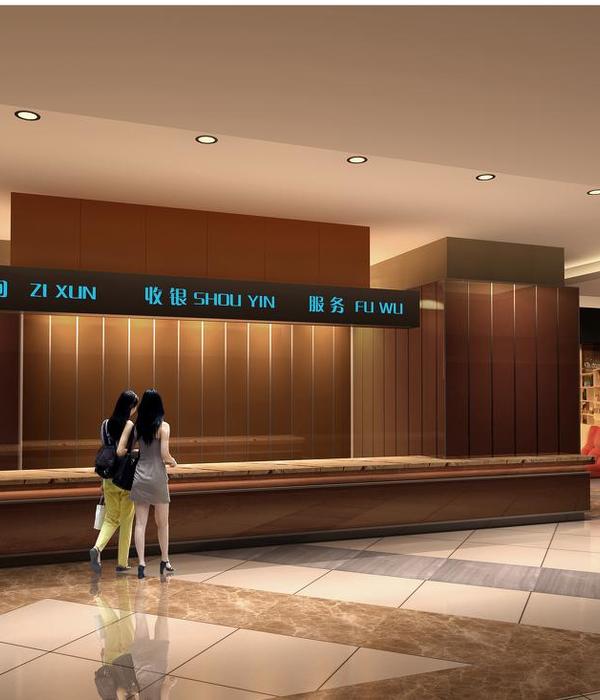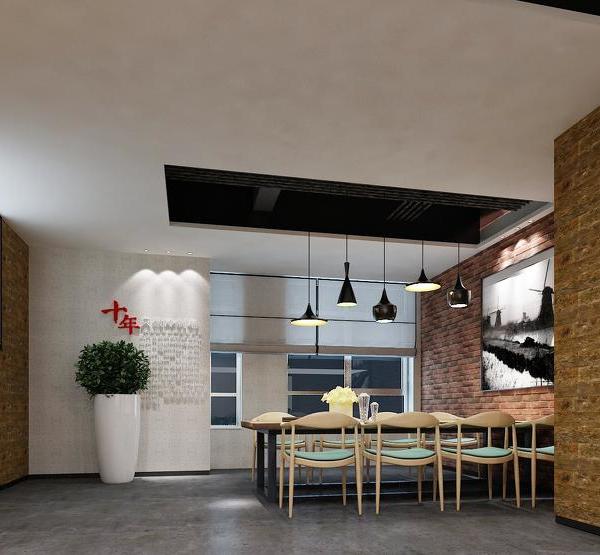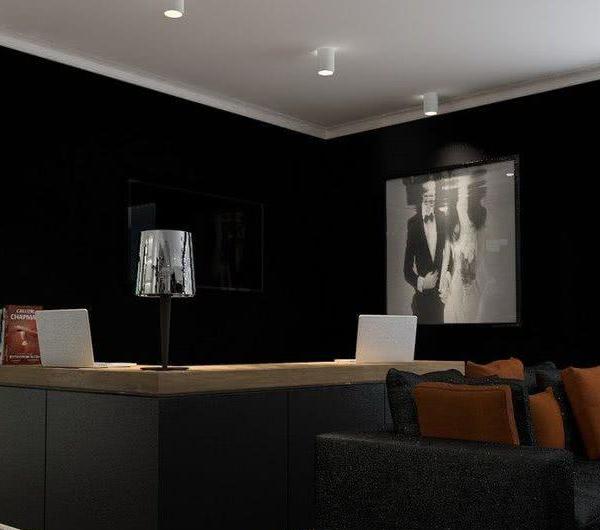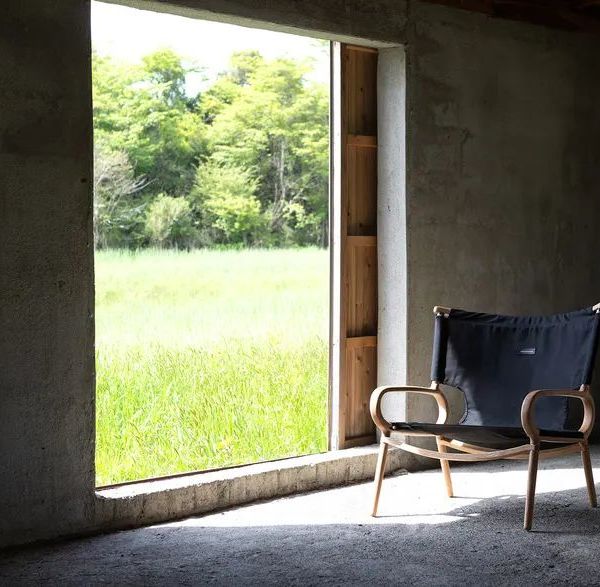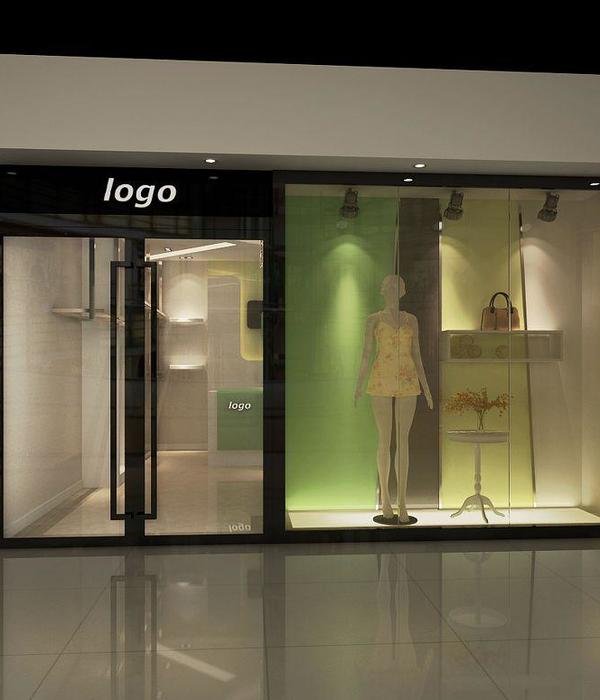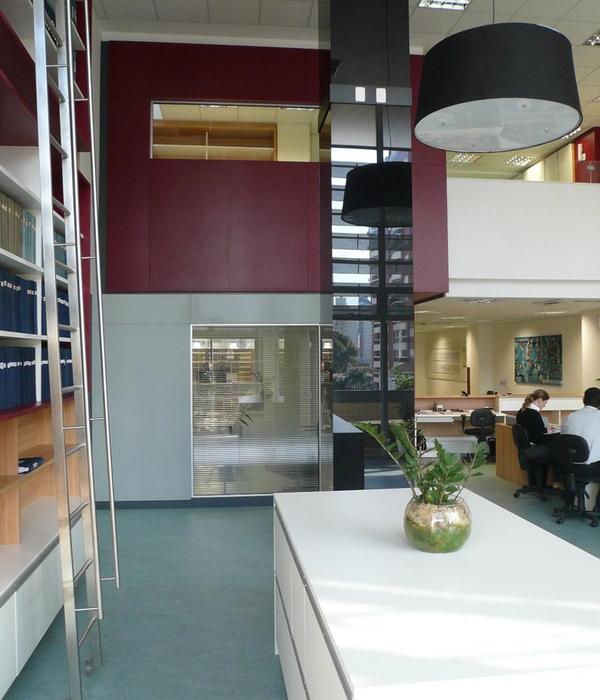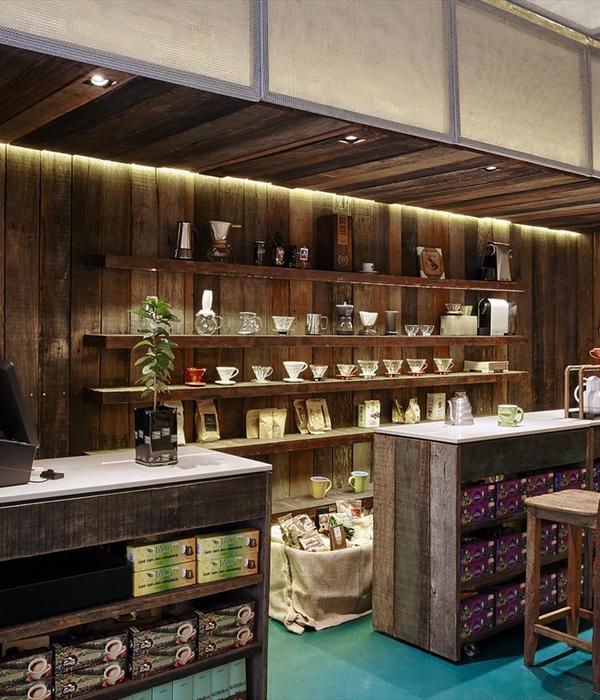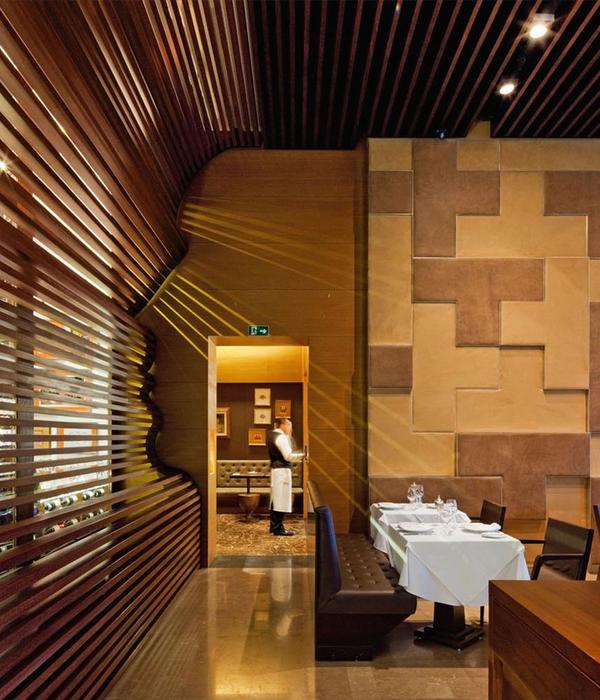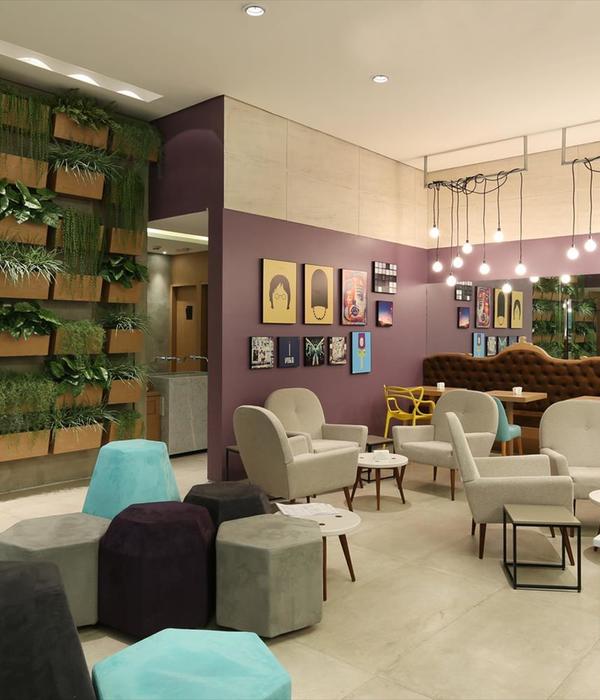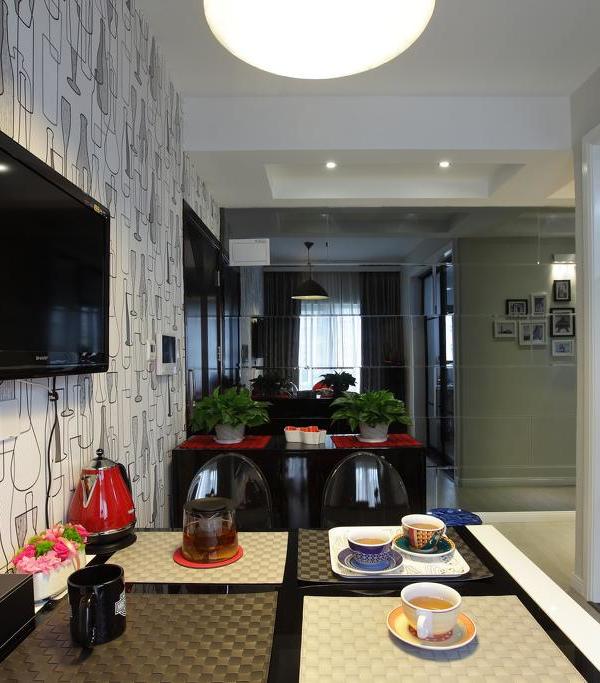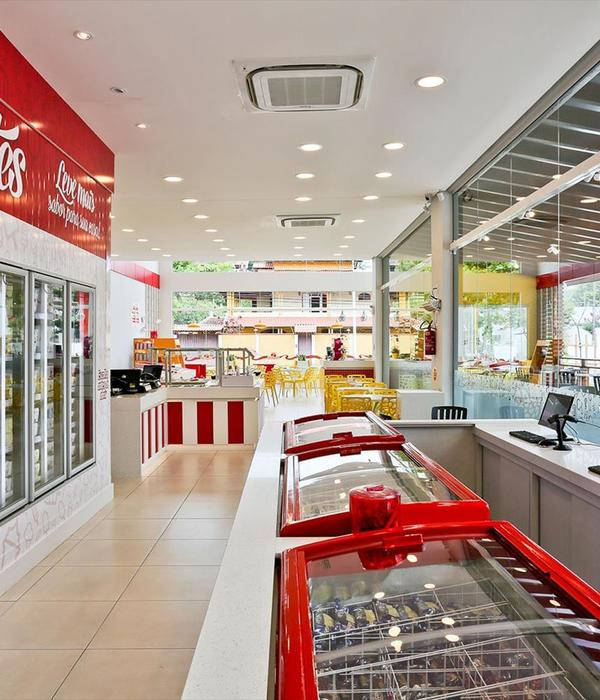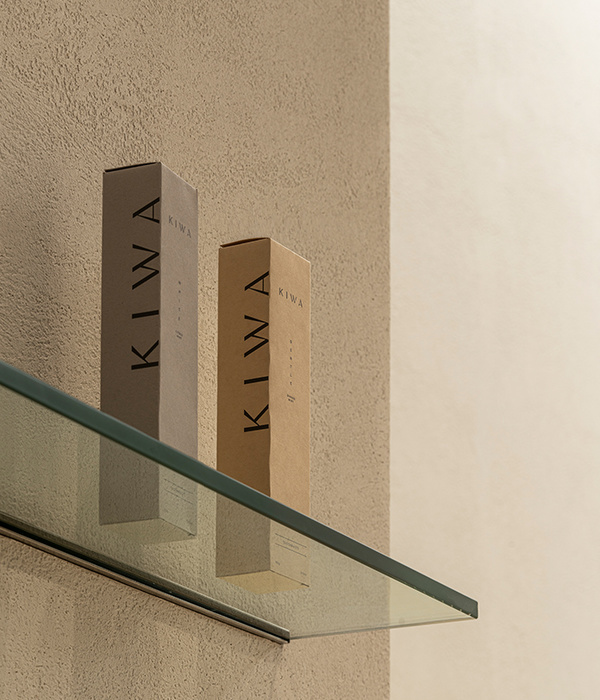美容院,理发馆,洗浴中心,餐厅,健身房,超市,这些城市里最普通又是我们最需要的场所,往往构成了我们生活的底色。这些你每天都会经过却从来不会注意到的地方,汇聚成城市的一种单调的表情,一种失焦背景。我们时常思考,这些关乎每个人最基础需求的空间,他的社会意义如何能被设计重构。如果说文化中心,图书馆,剧院被定义成一个城市的“精神殿堂”,一种中产阶级的“文艺理想”,那么这些仅仅满足普通人最基本的物质与生理需求的场所,是否也可以成为“市井的教堂”呢?我们的身体被服侍与美化的过程,也是对我们的精神净化的过程,我们的情绪以及对社会的认同感,与社会的联结,都通过美容院这一空间被激活与放大,重新定义自己。
The beauty centers, barber shops, restaurants, gyms, supermarkets that the most common places we need most but never notice. We often think about how these spaces related to everyone can be designed and reconstructed.If cultural centers, libraries, and theaters are defined as the “spiritual halls” of modern people. Why can’t those places that only meet the basic needs of ordinary people become “the churches in the market”? The process by which our body is beautified is also a process of purifying our spirit. Our identity with society will be activated and redefined through the space of the beauty salon, and we will also redefined ourselves.
▼门店立面,Store front © Studio FF
壹寇皮肤健康中心位于合肥市新中心区的一栋住宅楼底商。这里是附近的“美容一条街”。鳞次栉比的服务店招塑造了这里的市井街道氛围。在这种环境中,一个新的精神场所应该如何诞生出来?
Yikou skin management center is located in the ground floor of a residential building in the city center of Hefei, Anhui Province. This place is known as the “Beauty street”, the service shops in row shape the atmosphere of the city streets here. In this environment, how should a new spiritual place be created?
▼模型,model © Studio FF
完全的隔离只能创造神圣,而只有若即若离才能形成“市井中的独特场所”,通过在原有垂直界面上撕开一些缝隙,内部与外部形成了这种若即若离的联系。同时,这些撕开的部分自然的卷折,形成对内的包裹与对外的退让,创造了一个“暧昧”的场域。
Complete isolation can only create sanctity and when away from it can form a “holy place in the marketplace”. So the most important thing in the design is how to deal the transitional relationship between the interior of the building and the city. By tearing some gaps as an embrace create a kind of semi-detached connection from the inside out, like an “ambiguous” field.
▼在原有垂直界面上“撕开”缝隙 © Studio FF Some gaps were torn in the vertical interface of the building
在门口的部位,形成一个内凹的“城市空间”,从而使人自然过渡进入美容空间内部。而卷折使内部空间感受到了外部空间的压力与张力,从而形成了一些“窗口”,将外部的场景与光线有选择的投射入空间的内部,使人感受到“市井中的神圣”。
The concave allows people to naturally walk into the beauty space from the unban space, and also makes the users feel the power of the external space. At the same time, the lights from the windows make a sense as the “sanctity in the market”.
▼从内部望向立面的“卷折” View to the rolled-up surface © Studio FF
▼美容室,The beauty room © Studio FF
▼室内细节,Interior view © Studio FF
当这些撕扯进入到了洞穴的内部公共空间的时候,有一些巨大的顶部或底部光线如同科幻社会对原始洞穴的侵入,将自然的殿堂洗礼为未来机器内部的感受。一种原始的未来,让人们在一种反日常的状态中获得极大的舒缓身心的情绪释放。
When these tears enter the internal public space of the cave, there is some huge light from top or bottom like the intrusion of science fiction society into the primitive cave, baptizing the palace of nature as the feeling inside the future machine.The intention like primitive future or sanctity of machines becomes a release of the daily in modern society.
▼巨大的顶部光源 The huge light source above the space © Studio FF
▼围绕中庭布局 The spaces are arranged around the atrium © Studio FF
▼走廊,Corridor © Studio FF
▼等候空间,Waiting area © Studio FF
▼墙面细节,Detailed view © Studio FF
▼楼梯,Staircase © Studio FF
▼浴室,Bathroom
同时一种机器化的律动也反映到外表面陶棍材质的动态翻滚上,这种锯齿状的波动隐喻了一种对街道空间的机器般地呼应,成为城市街道尺度上更大的“肌理”,对远处的人们产生视觉的吸引与干涉,仿佛在暗示一种隐藏的城市内部力量。
This mechanical rhythm is once again reflected in the dynamic tumble of the ceramic stick material on the outer surface. This jagged fluctuation implies a mechanical massage of the street space, becoming a larger “texture” on the urban street. It produces a visual interference with people in the distance, as if to imply a hidden inner strength of the city.
▼陶棍材质的动态翻滚 © Studio FF The dynamic tumble of the ceramic stick material
人在现代化的过程中,自己的身体也在随着这个世界与环境,在被景观化,物化。实际上,美容与美体成为一种流行和日常,正代表了我们社会化身体的一个态度。自我美化的过程实际上是一种积极参与社会的过程。将自我通过美容不断靠近为社会所共识的“美”的社会形态,使人们拥有了更多的社会参与感,拥有了更多的自信。这些专业化的机构渐渐成为一种意识形态的空间。人们在此不仅得到身体上的美化,其精神与思想,在整个过程中也被按摩与纾解。美容中心是“市井的教堂”,但同时,与当代任何城市中的公共设施一样,在这个过渡异化的时代,它也是一部“温柔的机器”。人们愿意躺入这机器,以完成身体与精神的“净化”。从而“生产”出新的更符合社会审美需要的“新人”。
In the process of modernization, the body is also being landscaped and materialized with the environment. In fact, pursuing beauty has become a popular routine, which represents an attitude of our socialized body. The process of self-beautification is actually an active participation in the society which makes people have more confidence. These specialized institutions have gradually become an ideological space. People are not only beautified physically, but also spirits. The beauty center is “the church of the city”, but at the same time, like any other public facilities in the cities, it is also a “soft machine” in this era of transitional alienation. People are willing to lie down in this “machine” to finish the “purification” of the body and spirit. As a result, more “new standard ” people will be “produced”.
▼外观,Exterior view © Studio FF
就如同这个赛博朋克的时代,一切意义在文化与科技的互相杂交中产生出来。城市的社会性与人的精神意愿在争夺着对这种基础空间的侵占性。这也就提出一个问题,到底它更属于城市,还是更属于来此消费的个人体验?时间会给我们答案。
Just like this era of cyberpunk, all meanings are produced in the hybridization of culture and technology. The sociality of the city and the spiritual willing of people are competing for this basic space. This also raises a question: Does it belong more to the city or to the personal experience of consumption? The mix of “church” and “machine” is a thinking about the beauty salon.
▼剖面,Section © Studio FF
▼幕墙施工 & 陶棍节点,Facade construction & Ceramic sticks © Studio FF
▼平面图,Floor plans © Studio FF
项目地点:合肥市 项目性质:皮肤健康中心 主持设计师:李汶翰、常可 设计团队:袁博、王雅琴(项目经理)、赵建伟、姜宏辉、冯攀遨、陈纪元、邹洁茹 建筑摄影:Studio FF
▼项目更多图片
{{item.text_origin}}

